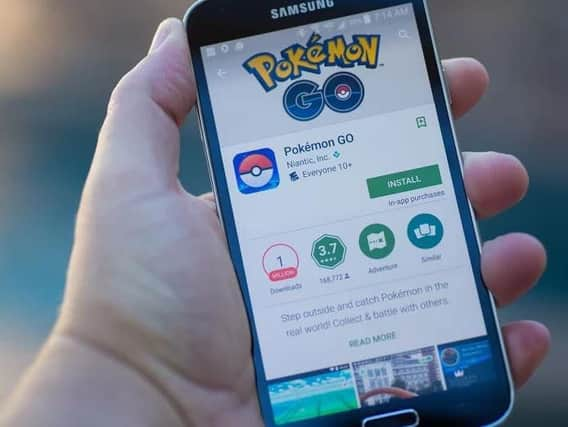FAD: Has Pokémon Go come and gone?


The mobile game ensnared tens of millions of players around the world, began to impact upon the wider social landscape, and even became a cringe-inducing reference point for global political figures.
But it seems the augmented reality app could now be rapidly falling out of favour. Pokémon Go has reportedly lost around a quarter of its user-base in recent weeks, with player figures down 10 million on their peak in July. Those who fell in love with the game are apparently abandoning it in droves. But just why are people giving up on Pokemon Go?
Advertisement
Hide AdAdvertisement
Hide AdLiam Gannon, 25, from Edinburgh, started playing Pokémon Go in early July, and was enthusiastic about sinking his time into the app.
“Pokémon was a large part of my childhood,” he explains, “so being able to collect all of the original 150 Pokémon was a large part of the attraction for me.
“It was a fun distraction on the journey to work, but when you see a Pokémon you want nearby it was really exciting. I remember sitting down in a cafe for breakfast in Tokyo and noticing a Farfetch’d nearby. I dropped everything to go and pursue that rare Pokémon. It was a wee bit thrilling.”
But after playing the game for roughly a month, that thrill had started to seriously diminish.
Advertisement
Hide AdAdvertisement
Hide Ad“Eventually the novelty wore off. The mechanics aren’t really deep enough to keep me invested in the game.
“On top of that it’s a major drain on my phone’s battery, and you can’t run it in the background, so to find Pokemon or hatch eggs you have to keep the app open.
“It’s not that I dislike the game now. It’s just too much effort.”
That claim of “too much effort” is almost directly echoed by another early adopter, Jack Nelson, who lives in Nice in France and stopped playing the game around two weeks ago.
Advertisement
Hide AdAdvertisement
Hide Ad“I stopped because you have to put in real effort to be any good at it,” he notes. “You can’t really play casually. I’d open it if I was on the bus and was bored, and then all you get is Pidgeys and Zubats and Ratatas.
“Yet you see gyms where people have CP 4000+ Dragonites and Laprases and Aerodactyls and it’s like ‘how much money and time and energy do I have to invest to even get close to these over-powered Pokémon, from people who probably dedicate themselves to Pokemon Go as much as athletes do to training for sport?’
“The app allows people with too much time and money to blitz everybody else and it’s just not enjoyable.
“And that’s if you’re in a city. If you live in the countryside there’s just nothing to do.”
Advertisement
Hide AdAdvertisement
Hide AdProfessor Mark Griffiths, a psychologist at Nottingham Trent University, and director of the International Gaming Research Unit, wrote an article at the height of Pokémon Go’s popularity exploring its appeal.
"At the time, he cited its social nature, collection mechanics and ‘never-ending’ nature as reasons for its astonishing success. However, he now notes that these positives may in fact be back-firing for the game.
“Some of them can be turned on their heads as reasons for becoming unpopular – most notably the lack of novelty and the fact that if others in your peer group stop playing, it may lead others to stop playing.”
The researcher notes that his own son was an avid player at the start, but now feels the experience has become “boring”.
Advertisement
Hide AdAdvertisement
Hide Ad“Some players who started to ‘catch ’em all’ have now done that and don’t feel they need to do so anymore.
“There are also those who say it was taking too much time out of their day to carry on. There will also be those who didn’t realise it would take so much effort to catch them.”
In other words, the very things that made Pokémon Go so appealing in the short-term may now be making it far less so in the long-term.
Not everyone has given up though. Clare Longstaff from Yorkshire acknowledges that she’s personally grown tired of Pokémon Go: “As time goes on and the levels go up you have to collect more points, and it seems to be going on forever. We’re finding the same Pokémon and there’s nothing different. It’s boring and repetitive and they’re not changing it enough.”
Advertisement
Hide AdAdvertisement
Hide AdBut she’s also delighted that her nine-year-old son Jacob, who has autism, remains enraptured by the game.
“He likes repetition. He likes consoles and the iPhone and this gets him out of the house. It’s nice going out in the fresh air with him. Jacob’s still happy with it. And if he’s happy – I’m happy.”
Ben Dufton from Newcastle, meanwhile, suggests he’s settled into a sort-of love/hate relationship with the app, cycling between disinterest and avid excitement.
“As the levels progress and the same Pokémon are available I get bored, then all of a sudden there’s loads of new ones – so I get really obsessed again. It seems to go around in circles!”
With an estimated 30 million people still playing, the compulsion certainly remains as strong as ever for some. But that can’t hide the fact that for many, the novelty has worn off.